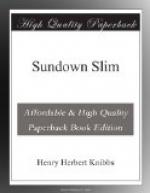He paid no attention to a tumble-weed gyrating across the Apache road. Neither did he seem disturbed when a rattler burred in the bunch-grass. Even the startled leap of a rabbit that shot athwart his immediate course was greeted with nothing more than a snort and a toss of his swinging head. Such things were excuses for bad behavior, but he was of that type which furnishes its own excuse. He would lull his rider to a false security, and then . . .
The pinto loped over level and rise tirelessly. Sundown stood in his stirrups and gazed ahead. The wide mesas glowing in the sun, the sense of illimitable freedom, the keen, odorless air wrought him to a pitch of inspiration. He would, just over the next rise, draw rein and woo his muse. But the next rise and the next swept beneath the pinto’s rhythmic hoofs. The poetry of motion swayed his soul. He was enjoying himself. At last, he reflected, he had mastered the art of sitting a horse. He had already mastered the art of mounting and of descending under various conditions and at seemingly impossible angles. As Hi Wingle had once remarked—Sundown was the most durable rider on the range. His length of limb had no apparent relation to his shortcomings as a vaquero.
Curiosity, as well as pride, may precede a fall. Sundown eventually reined up and breathed the pinto, which paced with lowered head as though dejected and altogether weary—which was merely a pose, if an object in motion can be said to pose. His rider, relaxing, slouched in the saddle and dreamed of a peaceful and domestic future as owner of a small herd of cattle, a few fenced acres of alfalfa and vegetables, a saddle-horse something like the pinto which he bestrode, with Chance as companion and audience—and perhaps a low-voiced senora to welcome him at night when he rode in with spur-chains jingling and the silver conchas on his chaps gleaming like stars in the setting sun. “But me chaps did their last gleam in that there fire,” he reflected sadly. “But I got me big spurs yet.” Which after-thought served in a measure to mitigate his melancholy. Like a true knight, he had slept spurred and belted for the chance encounter while held in durance vile at Antelope. “But me ranch!” he exclaimed. “Me! And mebby a tame cow and chickens and things,—eh, Chance!” But Chance, he immediately realized, was not with him. He would have a windmill and shade-trees and a border of roses along the roadway to the house—like the Loring rancho. But the senorita to be wooed and won—that was a different matter. “’T ain’t no woman’s country nohow—this here Arizona. She’s fine! But she’s a man’s country every time! Only sech as me and Jack Corliss and Bud and them kind is fit to take the risks of makin’ good in this here State. But we’re makin’ good, you calico-hoss! Listen:—




